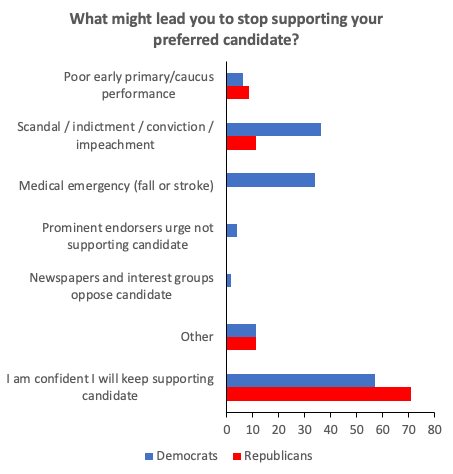The enthusiasm gap among party chairs
Democrats and Republicans are hugely different in their commitment to their likely nominees
There’s a stereotype of current Democrats as being fairly pragmatic and unenthusiastic about their backing of Joe Biden, and a very different stereotype of current Republicans as being wild and rabid enthusiasts for every utterance by Donald Trump. In my most recent survey of Democratic and Republican county party chairs, I sought to put this to the test.
Now my impression is that these stereotypes are pretty recent. It used to be that, as the old saying goes, “Democrats fall in love, Republicans fall in line.” (I’ve seen that attributed to Bill Clinton although it may predate him.) That’s been turned on its head during the Trump years, where Democrats have a pretty functional and dispassionate nomination system while Republicans are throwing out one tradition after another to back Donald Trump. But is this true of just party voters? Or beyond that?
I asked the local party chairs in my survey (109 Republicans and 231 Democrats), first, if they had made up their mind about supporting a presidential candidate. About two-thirds of Republicans and about nine-tenths of Democrats said they have picked a candidate.
Then I asked those who had made up their mind about a candidate what, if anything, might lead them to stop supporting that candidate. I gave them several options, and told them they could check as many as were appropriate. These options were:
the candidate performs poorly in the early caucuses and primaries.
the candidate has a serious scandal, is impeached, or is indicted for / convicted of a serious crime (the wording was slightly different across parties).
the candidate suffers a medical emergency, such as a fall or stroke.
prominent party endorsers urge a vote against the candidate.
prominent newspapers or interest groups urge a vote against the candidate.
They could also simply say that they are confident they will keep supporting the candidate no matter what.
The results appear in the chart below. Right off the bat, we can see some substantial party differences. Democrats are far more likely to say that they’ll abandon their candidate, particularly for scandal/impeachment/indictment/conviction (36% of Democrats, 11% of Republicans) or for medical emergency (34% of Democrats, 0% of Republicans).
Let’s think about that for a second. Trump has already been indicted 91 times, and conviction is pretty likely for at least one of those. Republican chairs know this. But they’re very reluctant to say it would change their mind. Meanwhile, roughly a third of Democrats think they would change their mind if Biden is involved in a serious scandal or impeached, even though they know there is an evidence-free impeachment inquiry going on in the US House right now.
It’s also pretty striking that a third of Democrats say they’d rethink Biden if he had a fall or a stroke. It’s as though they’re saying that they’ve been willing to suspend their concerns about Biden’s age since he seems to be a pretty healthy 81, but as soon as they see some real evidence of decline, they’ll drop him like a hot potato. Meanwhile, zero Republican chairs are concerned about aging symptoms from 77-year old Donald Trump.
And at the bottom we see that significantly more Republicans (71%) than Democrats (57%) say they’re confident they’ll keep supporting their candidate no matter what.
It’s interesting to break this down by candidate. For the Democrats, there’s no real distinction — just about every Democratic chair who said they’d made up their mind is supporting Biden. But the Republicans are more torn: 37% are for Trump, 16% for Nikki Haley, 9% for Ron DeSantis, and 32% are still uncommitted. Among Haley’s supporters, 35% say they’re confident they’ll keep supporting her. Among DeSantis’ supporters, 60% say they’ll keep supporting him. But 92% of Trump’s supporters say they’ll keep backing him no matter what.
Now, there’s something else going on here that helps explain these differences across party. Democratic chairs are overwhelmingly committed to Biden at this point, just assuming that he’ll be the nominee. This means that people committed to him include many who might be supporting another candidate if a viable one were running. As in 2020, Biden’s supporters include quite a few who don’t really love him, but they think he can win in a general election.
But roughly a third of Republicans are still uncommitted to a candidate, and thus they don’t appear in the graph above. That is, assuming Trump does drive other candidates out of the race, he will win a lot of supporters who are not necessarily passionate about him but just don’t have a real alternative. Right now, however, anyone who’s with him is enthusiastically so.
Yet while some of this may be an artifact of the data, there is likely also something here about the candidates particularly, and even about different cultures between the parties. Joe Biden has a 79% approval rating among Democrats right now, which is pretty similar to other presidents’ approval ratings among their own partisans. But a lot of Democratic chairs just seem to be unenthusiastic in this approval and are open to reasons to drop him.
I’m continually struck by the sharp distinction from 2020, when Democrats were overwhelmingly of the opinion that only Biden could win. Now many seemed convinced of the opposite. None of the evidence has really changed, of course, but Democrats seem particularly gifted at getting in their own heads about this stuff.







I knew quite a few Arapahoe County party chairs during my years in Colorado. They raised some money, ran the county conventions and liked to party with elected officials. None that I observed said much of consequence or influenced many votes.
After a year or two in office, most gave up on the grind and went back to their private lives.
Candidates win elections, not county or state chairs, I think. I don't know who my county chair is in Florida and don't need to.
With the Internet, blogs, political sites and other sources of political information, I'm thinking that most voters have a lot of information sources and influencers who are more effective than party chairs.
What are the degrees of confidence for your polling?